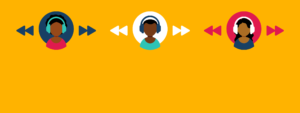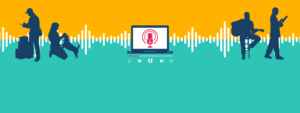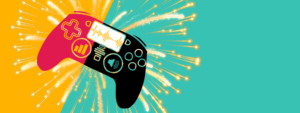What do habitual podcast listeners – the true blue podheads – get that other listeners don’t?
That’s an important question. If podcasting is going to continue to grow year after year, the industry not only needs to encourage more people to listen to their first podcast, but it also needs to understand how to get those who have tried a podcast to listen more often.
We had the privilege of getting some insight on this as Signal Hill Insights supported Sounds Profitable and their partners with their latest study, The Podcast Landscape. This is a foundational study – Sounds Profitable’s largest to date surveying more than 2,400 adult Americans – and offers broad and deep learning about podcasts and how they are perceived by a vast range of different subgroups.
Habitual Podcast Listeners – Big Listeners, but Still a Small Slice of Americans
One of the segments identified in the study are the habitual listeners. You probably know a few of them. You may be one yourself. They have made podcasts part of their life. They listen to podcasts for 5+ hours a week, making them a core audience for podcast advertisers. And they’re influential, with more than 4-in-5 recommending podcasts to others in their social circle.
But there is clearly room for growth. These habitual listeners currently represent only 5% of all adult Americans, according to The Podcast Landscape study.
What are their secrets? What do they know about listening to podcasts that others have yet to discover? And how can we share those secrets with others so the podcast industry can get more habitual listeners?
The Benefits of Podcast Listening, According to Habitual Listeners
The Podcast Landscape study presented any participant who ever listened to a podcast with a list of possible benefits – and asked how important, if at all, each benefit was to them personally.
We noticed some revealing differences between habitual podcast listeners and more casual listeners.
Looking first at content benefits, the chart below shows how many habitual listeners feel each benefit is “very” or “somewhat” important – and compares these results to those of monthly podcast listeners who listen to podcasts less than once a week. We’ll call them “dabblers” because they have yet to get the podcast habit. They’re still just dabbling.
When it comes to what they see as the benefits of podcast content, the results are quite similar between the two groups. Both habitual listeners and casual listeners generally know the types of podcasts that are available and are about as likely to see a similar benefit to each.
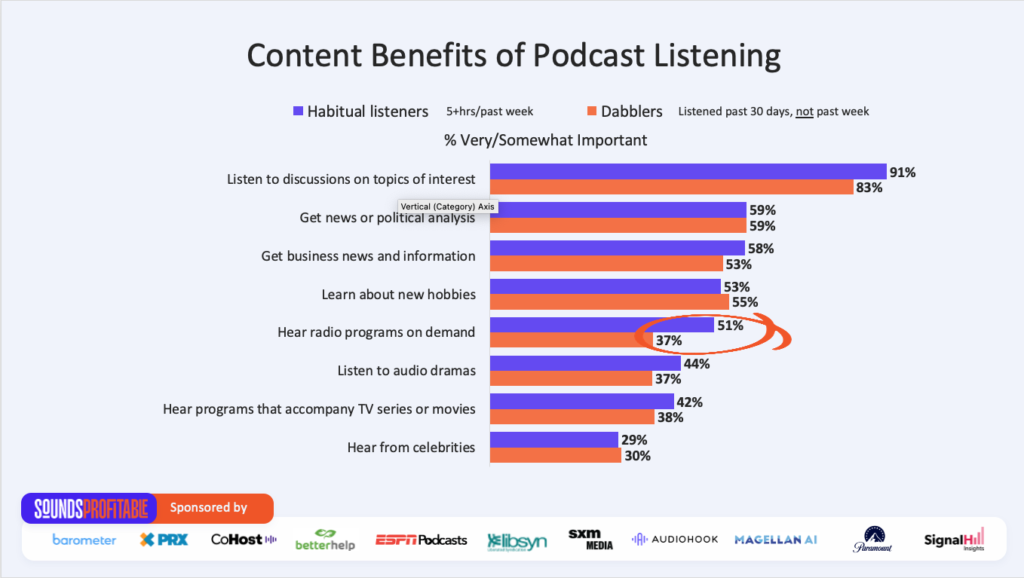
I flagged one exception in the above chart – and that’s radio programs on demand. More than half (51%) of habitual listeners see the ability to hear radio shows on demand as an important benefit of podcast listening, compared to just over a third (37%) of the dabblers.
Is that because the habitual podheads are bigger fans of radio than the more casual dabblers? No. Digging into the data, they’re both equally likely to be weekly radio listeners. More likely, habitual listeners have simply figured out how to use podcasts to listen to their favourite radio shows on their own schedule. And most dabblers haven’t. That makes listening to radio shows on demand more of a usage benefit than a content benefit.
Habitual Listeners Know How to Use Podcasts to Make their Lives Better
The usage benefits of podcast listening most clearly distinguish habitual listeners who have incorporated podcasts into their lives from the more casual listeners who have yet to get the podcast habit.
Checking the usage benefits of the chart below, far more habitual listeners than dabblers find the ability to listen to podcasts while doing chores to be an important benefit and, to a slightly lesser extent, listening while driving, traveling, walking or exercising. Habitual listeners are also much more inclined to value the use of podcasts for companionship, to keep them company while they’re alone.
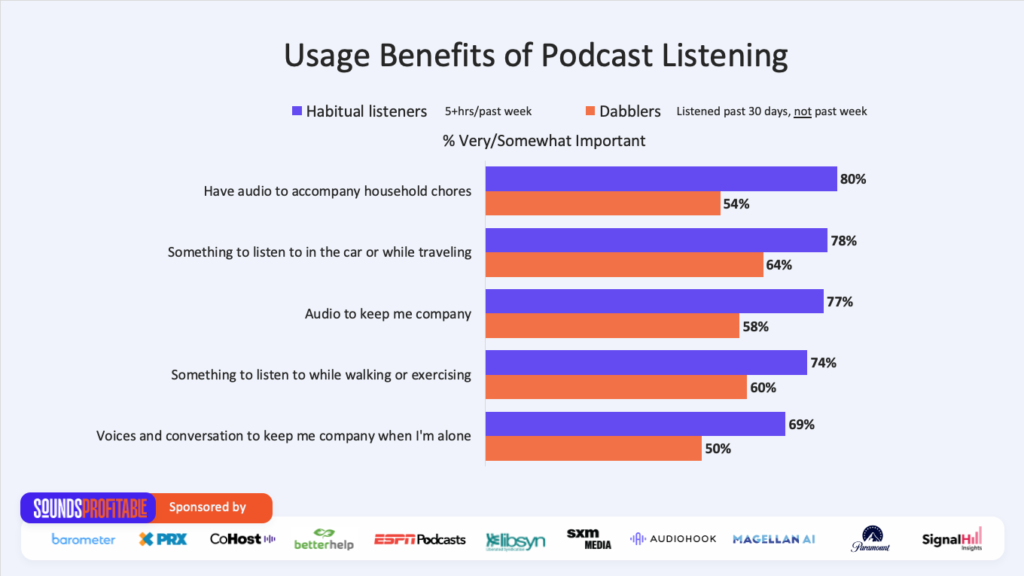
Habitual Listeners Optimize the Use of their Time to Engage and Enrich Themselves
By listening to podcasts while doing other things – specifically those times when their eyes are busy but their minds are free – habitual listeners are using podcasts to get relief from the drudgery of chores or the boredom of other mindless tasks.
Sure, others will take the same opportunity to listen to music instead. But, for the naturally curious, those people who are always on the lookout to learn something new, podcasts are a perfect solution. We’ve seen this in the “need states” research we’ve done in the past; the chance “to learn something new” is podcasting’s superpower compared to other types of audio. And unlike reading or video, you don’t need to set aside separate time to do it.
How Can Podcasting Get More Habitual Listeners?
As an industry, podcasting needs to get more casual listeners to see the same benefits of podcast listening that the habitual listeners see. In other words, it needs to train the dabblers on how they can make better use of podcasts.
But how?
You don’t have to look any further than the radio history book for a successful example of how to promote user benefits of listening.
One of the pioneers of the all-news radio format, 1010 WINS in New York launched in 1965 and continues to train listeners on how to use its rotating (and continuously repeating) news wheel format with its slogans “You give us 22 minutes, we’ll give you the world” and “listen two, three, four times a day.” Nearly 60 years later, WINS continues to be one the top-rated stations in New York.
Closer to home, the phrase “or wherever you find your favorite podcasts” has helped to promote podcasting’s open ecosystem, even if it is too vague to be that instructive to the newbies.
Perhaps the podcast industry needs to put itself back into a beginner’s mindset. In essence that’s what 1010 WINS does, providing clear instructions that don’t assume you know how the station works, but so concisely that it doesn’t annoy the dedicated listeners. For the first time, The Podcast Landscape gives the industry evidence for similar things to teach the dabblers. Now it’s time to apply the lesson.
***
The Podcast Landscape report as well as the recorded webinar presentation with Tom Webster is available here – no registration required – on the Sounds Profitable website. The Podcast Landscape is made possible thanks to the support of these leading brands in podcasting: Barometer, PRX, CoHost, Better Help, Libsyn, ESPN Podcasts, SXM Media, Audiohook, Magellan AI and Paramount.

